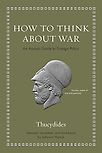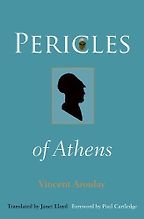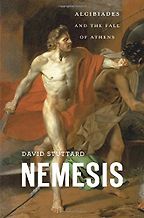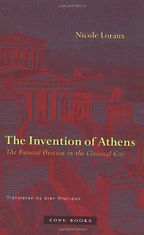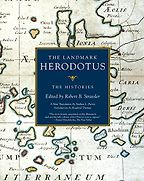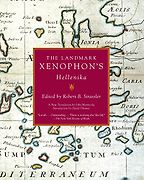Your book, How to Think about War, is an excellent introduction to Thucydides and his History of the Peloponnesian War. You’ve also chosen five other books to help understand and put him in perspective. But before we get to those, can you tell me who Thucydides was? Why we should care about him, two and a half thousand years later?
Thucydides came of age in what we think of today as the ‘Golden Age’ of classical Athens. He was an eyewitness to the events of the Peloponnesian War and served for some time as general in the war. So he was very much a part of the story that he told.
Thucydides was also someone who says, right from the outset, that he wants his work to be a possession for all time. He thinks that even though the Peloponnesian War is the biggest war the Greek world has yet known, the forces that led to it will be repeated, given that human nature is what it is, in the future. He envisions that his work will be not quite a manual or a blueprint, but that it will offer insights for people later down the line. So he really set up his History of the Peloponnesian War as something that should be read by future generations.
That call has been taken up. Even beyond scholars of history, it has become extremely influential in foreign policy and political science circles. Thucydides’ History of the Peloponnesian War is really considered one of the founding documents of the field of international relations: people who are interested in the supposed contrast between ‘idealism’ and ‘realism’ as international relations principles. We really see Thucydides as someone who charts the contours of those different philosophies. The work has gone on to be extremely influential, as he hoped it would be.
In the introduction to your book, you mentioned Harvard political scientist Graham Allison’s book Destined for War, which predicts war between China and the United States based on his idea of there being a ‘Thucydides trap.’ He was even called to make a presentation to the National Security Council about it. On Five Books as well, various eminent foreign policy specialists have suggested that Thucydides already said pretty much all there was to say about the subject. But in your book, How to Think About War, you cast a bit of a warning, don’t you?
“The Athenian speeches rendered by Thucydides may well be dazzling for their displays of rhetoric, but it is easy to forget that the deliberations held in the framework of Athens’ renowned and radical democracy resulted in policies that led to the loss of innumerable lives and to the collapse of Athens’ empire after little more than half a century.”
Am I right to think you’re a bit more guarded in your admiration for Thucydides?
I’m guarded not so much in my admiration for Thucydides as I am in my admiration for his Athenian characters particularly. The speeches that people are so interested in today, like Pericles’s funeral oration, are delivered in a very particular context within Thucydides’ own narrative. Something that’s really important about Pericles’s funeral oration—where he outlines this ‘shining city upon a hill’ principle—is that it’s then immediately juxtaposed with this gruesome, graphic narration of the complete anarchy that broke out in Athens due to the plague. Thucydides brings out a huge difference through these contrasting passages—between the ideal Athens that’s charted out by Pericles and the real Athens that experiences this major health catastrophe.
“It’s in the space between the lines that a lot of the really subtle, implied, analytical work that Thucydides is doing comes out”
My admiration for Thucydides really only increased through this project, in part because you see how complex the speechmakers themselves are as characters. It’s really impossible to identify any one of them—or any groups such as the Athenians—with Thucydides himself. And even though I did only translate the ‘greatest hits’ of the speeches, I think that—and I try to bring this out in my introduction—they’re really important to read with the passages around them. It’s in the space between the lines that a lot of the really subtle, implied, analytical work that Thucydides is doing comes out. He shows rather than tells through these very carefully laid out juxtapositions.
But in some international relations discourse, the Athenians have become isomorphic with the idea of Thucydides himself. Having any kind of blind admiration for the Athenians is incredibly misguided—because we all know what happens to them at the end of the Peloponnesian War.
In the list of books you’ve recommended, you haven’t included a full translation of Thucydides’ History of the Peloponnesian War. I think it is best to start with your book, in which you introduce the work and translate the important speeches—rather than immediately committing to a long book. But is there a translation of the full work you would recommend for somebody who gets hooked on Thucydides?
The translation that I think is really useful—depending on what you want to do—is The Landmark Thucydides. It’s an updated version of the old Crowley translation, which people have problems with, but the apparatus of The Landmark Thucydides is extremely useful. It gives you marginalia about what year it is that he’s talking about; there’s plenty of footnotes; there’s interpretive and historical essays at the back of it. It’s an all-in-one resource for reading Thucydides and understanding a little bit about the historical and cultural context around his history.
Just in terms of the language, my personal preference—even though it is in several ways derivative of earlier translations—is the Rex Warner translation. I really like it. His English prose is very clever and concise in a way that I find very much in the spirit of Thucydides. People do have some complaints about how accurately it represents what’s going on in the Greek—which you can never completely accurately represent in English anyways.
And is it right to say Thucydides is notoriously hard to translate, his ancient Greek?
Yes. It was considered notoriously hard even in Antiquity, by not only Cicero, but also a critic called Dionysius of Halicarnassus, who was a native Greek speaker. He comments in an essay on Thucydides that no one can read him without commentaries and the sorts of interpretive tools that we use today.
“Every translation is an act of interpretation, but with Thucydides, this is even more true than usual”
Of course, every translation is an act of interpretation, but with Thucydides, this is even more true than usual. You have to make a lot of choices, in terms of understanding what he’s saying in Greek, before you even get to the question of how best to render it in English. You really have to puzzle out, ‘What’s he’s actually getting at?’
Let’s talk about the books you’ve chosen to better understand Thucydides and his time. The first book on your list is by Vincent Azoulay, and it’s called Pericles of Athens. Pericles was a general, the leader we most associate with Athens’ golden age, but he ended up dying of plague before the end of the Peloponnesian War. Thucydides was a fan of his, is that right?
It’s very hard to tell what exactly Thucydides is a fan of, or who he is a fan of. That’s part of the work that Vincent Azoulay does, trying to unpick the myths around Pericles. He tries to read against the grain of Thucydides, even though Thucydides is one of our major sources.
Thucydides really sees Pericles as the foremost citizen of the time. He even gives his name to this era: today we call it ‘the Periclean era.’ Azoulay gives a slightly different interpretation. He’s interested in the ways in which Pericles was constrained by the political circumstances, and was guided or constrained in his policies by the people.
Get the weekly Five Books newsletter
In choosing these books, what I was interested in doing was setting up Azoulay’s Pericles of Athens in contrast with David Stuttard’s biography of Alcibiades. These are two recent, very readable biographies of some of the preeminent people of the era, people who figure very prominently in The History of the Peloponnesian War, but they’re done in very, very different ways.
Azoulay takes a thematic approach, just because the actual sources we have are so thin and these figures are so shrouded in myth. He looks at Pericles as an orator, as a statesman, and also at his shifting reputation over time through history. Stuttard’s book is a more traditional, chronological, biographical approach. He’s facing the same problem, that we don’t really have that many sources for the life of Alcibiades. How do you spin a biography out of what little we have, especially when there’s so much accreted myth around these particular figures? Together, these two books form an interesting look at the different ways that you might deal with this kind of lack of information that we have, but still try to piece together some kind of narrative about these figures.
In terms of sparse biographical details, what about Thucydides? In your introduction, you mention that at the beginning of his history he identifies himself as an Athenian, and later that he served as an elected general—or ‘strategos’—in 424 BCE and was subsequently exiled. Do we know anything else about his background? Was he married, do we know anything about his family and friends?
We don’t really know anything other than what he tells us in passing in his work. He was old enough to have served as a general in the war; he also mentions that when the war broke out (in 431) he was old enough to understand what was going on. We tend to assume, then, that he was born in about 460. He came from a family of means—he had financial interests in mines in Thrace, north of Greece, which is why he was sent there as general in the 420s. He seems to have known the area, and had a connection to it. We don’t know much beyond that, but seeing as Thucydides was clearly very well educated it doesn’t seem too much to assume that at some point he ran into or even knew fairly well the other Athenian leading lights of his day: Socrates, Sophocles, and so on.
Before we move on to the next book, can you just quick summarize the takeaways from Azoulay’s book? What do we come away knowing about Pericles of Athens?
There are two big takeaways. Firstly, that Pericles himself was much more beholden to the people of Athens than Thucydides sets him up to be. Thucydides paints him as the de facto leader of the Athenians. Azoulay reads the people of Athens, the ‘demos,’ as exerting a huge amount of power and shaping what Pericles could do.
If Azoulay is right, what motive did Thucydides have for downplaying the influence of the demos?
It might be because Thucydides very much has a ‘big man’ approach to history: he sees history as often (though not always) being driven, at least at its turning points, by big, charismatic personalities.
And the other takeaway?
The second is that the myth around Pericles never stopped forming. Azoulay is very interested in the reception of Pericles. So he covers Pericles through Rome, through the Middle Ages, and onward and onward. He shows us how each age interprets Pericles in a different way, to fit their own time or their own political agenda. The continuing dynamism of the myth of Pericles is a really interesting takeaway from the Azoulay book.
I still feel I haven’t got a handle on who Pericles really was.
The problem with Pericles—and this has been one of the criticisms of the Azoulay book—is that for every ancient source, there’s another saying, ‘that’s just a myth’ or ‘that source is biased.’ For every representation of Pericles—even the ones that we have from Antiquity—there is a completely opposite perspective on him. I think that’s why he’s proven to have had this extremely malleable reputation over time. Depending on the time period and who’s doing the interpreting, our view of Pericles can just radically shift and invert itself.
Alcibiades, in contrast, has always been known as a playboy, this enchanting figure.
Let’s talk about him next, and the biography of him by David Stuttard, which you’ve already mentioned. It has the rather exciting title, Nemesis: Alcibiades and the Fall of Athens.
This is a very readable introduction not just to one of the key players of the era that Thucydides is writing about, but to the era itself. One of the things that David Stuttard tends to do really carefully—again because we lack so much actual concrete, biographical information about Alcibiades—is lay out the cultural context that produced him in Athens during the mid-5th century. He also writes about Alcibiades’s family, because he was descended from this important aristocratic family.
This all helps. The reader can then return to Thucydides’ History of the Peloponnesian War with a more fleshed-out picture of the cultural background of Athens at the time.
Both of these books have been criticized for being overly dramatic, romanticized biographies. But they do a lot of good work in laying out context and then, especially when read together, they provide an interesting insight into the particular methodological problems of dealing with this time period that’s so much discussed, but for which we actually have very little evidence.
Can you tell me a bit about Alcibiades? He was a ward of Pericles and a friend of Socrates and he changed sides a number of times during the Peloponnesian War, is that right?
He shows up at every critical juncture of Athenian history at this time. At one point, he defects to Sparta, but then has to leave because he was sleeping with the queen. He knows everyone and shows up everywhere, so if you follow his story, as Stuttard does, you wind up running into every major figure and place in the Greek world in this period. So actually, just because he got around so much, Alcibiades is a very effective way of tracing the bigger story of this historical period.
Was Alcibiades responsible for the fall of Athens, as the title of the book implies?
No, I don’t think Alcibiades was responsible for the ‘fall’ of Athens. But I do think he made that supposed fall a lot more interesting. His behaviour—the addiction to celebrity, the lavish displays of expenditure (like at the Olympics), the partying and sleeping around but also the company-keeping with Socrates—all of this works quite nicely as a kind of allegory for what’s gone wrong with the city of Athens itself, for why the city allegedly ‘fell’.
His over-the-top personality is very useful if you want to construct some sort of moralizing narrative about the fate of the city, the city that got too big for its britches and lost all sense of decency. But that, too, is a very tendentious reading of what ‘really’ happened in and to Athens.
Alcibiades was exiled, and so was Thucydides. It seems to be quite common for these Athenian generals to end up exiled. Why is that?
Thucydides was exiled for a campaign that went badly in northern Greece, a part of Greece where his family had economic interests in the mines. And yes, it was quite common when a general ran an unsuccessful campaign for the people to get rid of him for a while. It even happened to Pericles.
The amazing thing about Thucydides exile is that, had he not been exiled, he never would have had the time to write this work. It was really his exile that gave him the leisure to pursue writing his History of the Peloponnesian War.
The exile in Thucydides’ case—and other cases too—was not so dramatic as we think of it today. He wasn’t completely cut off. When we think of Ovid’s exile for example, all he does is mourn being cut off from Rome. Thucydides actually makes the most of being physically removed from Athens and is able to talk to people on both sides of the war. He still has access to information.
Shall we talk about The Invention of Athens, by Nicole Loraux next? Tell me about this book and why it’s on your list.
This remains my favourite book in the field. The Invention of Athens really got me interested in this time period and in the question, ‘How were the Athenians just so capable of convincing not only other people who lived in their own time, but even people in later generations, that their city was so profoundly special?’
I, personally, am very sceptical of this idea that there was something in the water that made them exceptionally smart. But they were extremely canny at creating this propaganda about their city.
In the book, Nicole Loraux looks at the institution of the Athenian funeral oration. We catch a glimpse of it in Thucydides Book II, with Pericles’s funeral oration, where he lays out this vision of the ideal city. That was a regular occurrence in Athens after the end of the Persian Wars: whenever there had been a major campaign or big battle, the city would gather and select someone whom they esteemed very greatly to deliver an oration over the dead. It was a time for the city to articulate who it felt that it was, to give a version of its own history, and to lay out this map of Athenian exceptionalism.
“The Invention of Athens really got me interested in this time period and in the question, ‘How were the Athenians just so capable of convincing not only other people who lived in their own time, but even people in later generations, that their city was so profoundly special?’”
And these orations became profoundly influential and have a lot of very interesting points of contact with other major Athenian cultural institutions—everything from the buildings and the monuments, and what was depicted on them. We see those myths mentioned in the funeral orations. There were also a lot of connections between the funeral orations and tragedy.
So what Loraux does in this book is gives us a really lyrical insight into the way that the Athenians crafted this fantasy about themselves and the city through these funeral orations.
Thucydides writes that the Athenians were “unique among men.” I presume you disagree with that view?
I do. I know that people today are interested in these particular moments and contexts that produce people of great genius, but what the Athenians really excelled at was the spin. Which in itself is productive, because if they can convince other people that the city is so fantastic, that will then draw people to it. It’s a canny strategy.
Books four and five on your list are both histories written by fellow Ancient Greeks. One is by Herodotus and the other by Xenophon. Let’s start with the earlier work, which is by Herodotus. Why do we need to read his Histories to get a better handle on Thucydides?
In some ways, you could look at these two books as a prequel and a sequel to Thucydides’ history. Herodotus was a historian who was writing a couple of decades earlier. We’re not quite sure about his dates, but he seems to have known how the first phase of the Peloponnesian War turned out. So maybe he was working until at least 421 or so.
The main subject of his Histories is the Persian invasion of Greece, but he does a lot more than just write about the Greco-Persian wars. He’s very interested in ethnography and documenting the specificities of different cultures beyond Greece—through the ancient Near East and into Egypt. He provides a much more textured, cultural lay of the land than Thucydides does, because Thucydides is not so interested in the specificities of different cultures.
But Herodotus, through his narrative of what happens with the Persian Wars, really lays out what then goes on to become the Athenian justification for their control of the Delian League and therefore the Athenian Empire. The Delian League is formed as an alliance to keep Persia at bay and this is what puts Athens in a position to be in charge.
Five Books interviews are expensive to produce. If you're enjoying this interview, please support us by donating a small amount.
In the first book of his history, Thucydides picks that up and shows how that position that Athens had, largely through the Athenians’ own behaviour, went on to breed a huge amount of resentment amongst the people who were allies of Athens and throughout Greece in general.
So I chose Herodotus because, on the one hand, he provides really important background. On the other hand, I think it’s interesting, as with Stuttard and Azoulay, to see the contrasting methodologies. With Herodotus and Thucydides, you see two nearly contemporary historians with very different approaches to history writing.
Herodotus is the one who is often called ‘the father of history.’ Robert Strassler, the editor of the edition you’ve recommended, The Landmark Herodotus, writes, “Although I had a high opinion of Herodotus when I began work on this edition in 1997, I felt at the time that Thucydides was the greater historian of the two. That is no longer my view.” So he seems to be won over to Herodotus.
I think whichever of the two you’re taken a really deep dive into becomes your favourite at that time. They work in such different veins. I find them both extremely compelling in different ways.
Just in terms of what you were saying earlier about spin, Herodotus is writing a history of the Persian invasions, but isn’t the thrust of his work, ‘Isn’t it amazing that this tiny Greek city unexpectedly defeated this powerful empire?’
If you trace the role of Athens, in the beginning, when the Persian king finds out that the Athenians have been involved in a revolt, he says, ‘Who are you talking about? I’ve never heard of them.’ So it starts out from this place where the Athenians are this tiny dot in the background. Then, as the narrative proceeds over the nine books, they come to completely dominate. In Herodotus’ time, they have come out of nowhere.
So Thucydides starts where Herodotus leaves off. What period is Thucydides covering exactly?
Thucydides covers, very briefly in Book I, from the end of the Persian Wars to the beginning of the Peloponnesian War. He really sees himself as doing some excavation—in fact that part of his history is called the ‘Archaeology.’ It’s this deep excavation of the forces that eventually led to the breakout of the biggest war that Greece had ever seen, which he locates in this resentment that the other Greeks—and particularly the Spartans, as the head of the Peloponnesian League—felt at Athens’s rise to power after the Persian Wars had ended.
So he catches you up in Book I and then we’re off and running through the Peloponnesian War. Thucydides had meant to cover the entire Peloponnesian War and he seems to know how it turned out—which is why we usually place his death around 400—but the narrative breaks off in the year 411. He clearly wasn’t able to finish his work.
There are several questions about the extent to which the work was dynamic, in that he was initially writing by marking out annalistically what had happened and then going back and inserting speeches. Some people, even in Antiquity, thought that’s maybe why it’s a little bit speech heavy towards the beginning of the work, because he had gone back and was inserting them. But it does break off in 411.
And at that point things were already going very badly for the Athenians?
Athens had suffered because of this disastrous Sicilian Expedition, as we call it, because we’re thinking of it from the Athenian perspective. The Athenian invasion of Sicily, from 415 to 413, went completely and terribly wrong for them. After that, the Peloponnesian War picks up again, with direct conflict between Athens and Sparta. People have realized that Athens is in this weakened situation and alliances with Sparta start intensifying. You get Persian support against Athens. It’s really all unravelling.
And then Xenophon—which is the last book you’ve chosen—gets going in 411 and takes us through to 362, is that right?
He picks up immediately where Thucydides leaves off. Thucydides was so admired, that people who wanted to make these historical interventions would just start where he left off in 411. Xenophon begins with, ‘After these things…’ That’s why I said that in some ways Xenophon really is the sequel to Thucydides.
He goes through to the end of the Peloponnesian War and becomes the major source that we have for what happened in Athens during the rise and the rule of the Thirty Tyrants. He then goes on into this very interesting period, in the first part of the 4th century, when Athens has some aspirations to regain the Aegean empire that it had. So the story doesn’t end with Thucydides.
The specific edition you’ve recommended is The Landmark Xenophon’s Hellenika, which is particularly useful because Xenophon leaves out a lot of things, presuming that the reader will know about them—whereas a modern reader probably won’t.
These Landmark editions are just incredibly useful tools. In a single book, you’ll get the main text, with a decent translation, and just about everything that you could want to help you understand what’s actually going on. These books are just absolutely magnificent. This series is wonderful.
So is Xenophon also viewed primarily as a historian?
Xenophon is a little bit more versatile. We only have Herodotus’s Histories and Thucydides’ History of the Peloponnesian War. Xenophon also writes Socratic dialogues—he’s very much a contemporary of Plato in that way—he writes treatises, he writes some works that are considered the earliest biographies. He writes in an unusually large number of genres, and is really seen as embodying the literary developments of the 4th century.
We were talking earlier about some people applying Thucydides to foreign policy. What about you? Which bit of Thucydides did you find most relevant to today’s world as you were reading and translating his work?
One that keeps coming back to me is the Sicilian debate. There’s this very poignant moment: the Athenians have basically already decided that they’re going to invade Sicily. Thucydides likes to depict a debate after it’s already been decided, but where people are revisiting or elaborating on the question. In the course of that debate, Nicias says, ‘I think that the greatest, most powerful move we could make would be not to invade at all.’
There’s also the Mytilenean debate, where again there is a revisiting of the original question. In the original assembly debate, about what to do in Mytilene, the Athenians had decided to put all the men of the island to death and to enslave the women and children. Then, for various reasons, that’s revisited. It’s put back on the table and the Athenians change their mind. So I (and I’m not alone here) am now thinking of that in the context of Brexit, where the issue of people being able to change their minds comes up quite a lot.
I loved the opening quote of your book, which is an excellent reminder for governments and leaders around the world: “I fear our own mistakes more than the enemy’s schemes.”
Yes, when I read it I just knew immediately that it would be the epigraph for my book. I was talking to a retired colonel the other day, who had read the book, and that was the first thing he said, that that quotation was spot on.
Five Books aims to keep its book recommendations and interviews up to date. If you are the interviewee and would like to update your choice of books (or even just what you say about them) please email us at [email protected]

